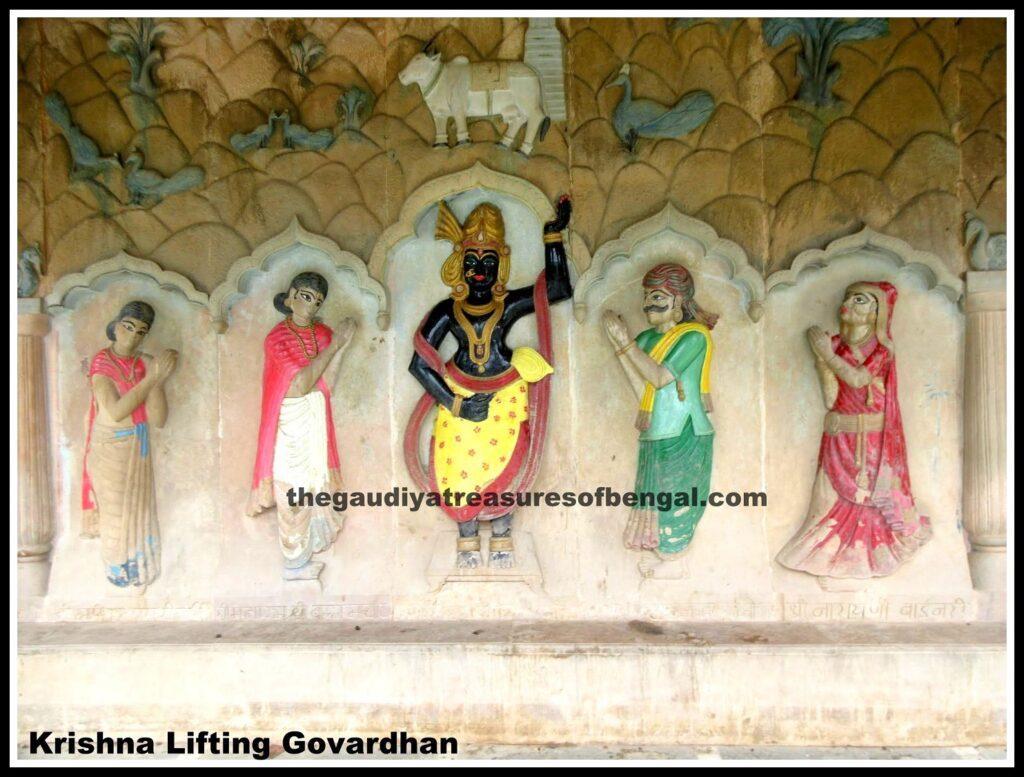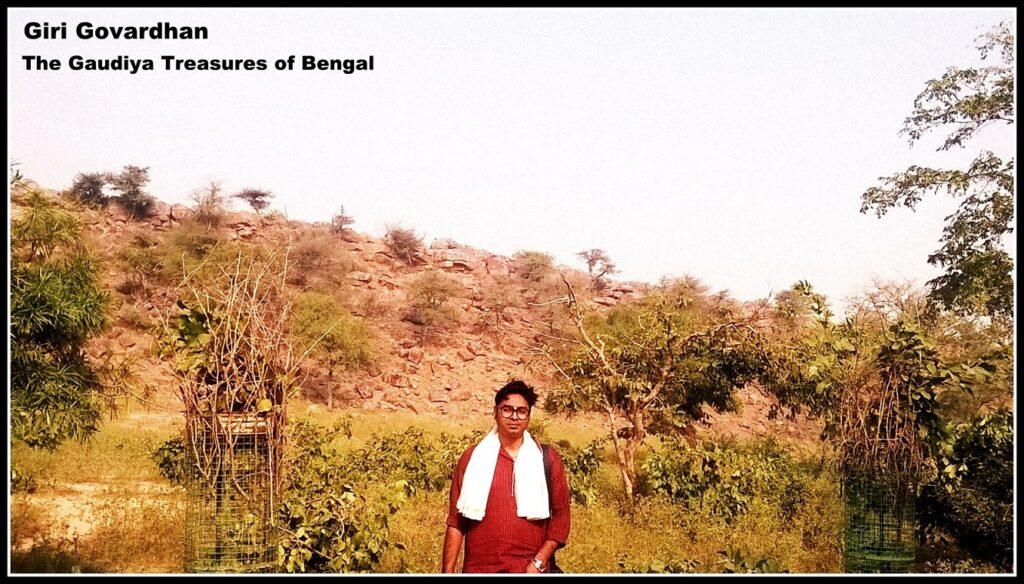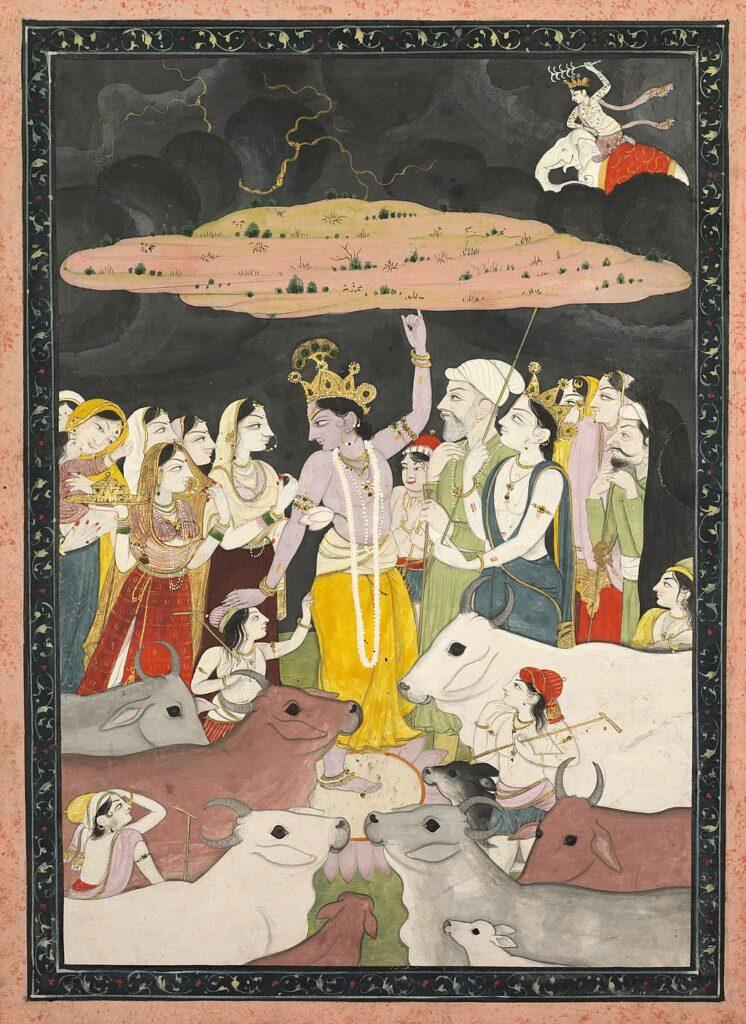
Krishna’s Govardhan Lila can be summarized in the following words. In the enchanting village of Vrindavan, young Krishna becomes curious about a grand sacrifice his father and the cowherd men are preparing for. Despite being omniscient, Krishna plays the role of an innocent child and asks his father about the purpose of the offering. Initially, Nanda Maharaja, Krishna’s father, explains that the sacrifice is intended for Indra, the celestial ruler. However, Krishna persuades his father and the villagers to instead worship Govardhan Hill, emphasizing that the demigods are servants of Krishna and that their true duty lies in protecting the cows. When Indra witnesses this defiance, he becomes furious and orders a devastating storm to destroy Vrindavan. To protect the villagers, Krishna effortlessly lifts Govardhan Hill, providing shelter for everyone beneath it. Indra realizes his mistake, seeks Krishna’s forgiveness, and performs a heartfelt worship. In the end, harmony is restored, and the villagers continue to revere Govardhan Hill as a symbol of Krishna’s love and protection. This article aims to provide a detailed account of the Govardhan lila.
Krishna’s questions to Nanda Maharaj
In the mesmerizing village of Vrindavan, on a day brimming with vivid colors and the delightful scent of blossoming flowers, the youthful and divine Krishna glimpsed His father, Nanda Maharaja, and the cowherd men immersed in the arrangements for a magnificent sacrificial ceremony. With curiosity sparkling in His eyes, Krishna approached His father and tenderly inquired, “Dear father, for whom is this magnificent offering intended? What purpose does it hold? Please enlighten me, for I am eager to understand.”
Although Krishna, the Supreme Personality of Godhead, possessed omniscience and knew well that the sacrifice was dedicated to Indra, the celestial ruler, He portrayed the innocent guise of Nanda’s beloved child, posing His questions like any curious young boy. Nanda, somber and contemplative, continued with his solemn tasks, perceiving Krishna as a tender offspring unaware of the intricacies involved. Under the spell of Krishna’s divine influence, Nanda viewed the all-knowing Supreme Lord merely as his own little boy.
Yet Krishna persisted in His inquiries, imploring His father with gentle insistence, “My dear father, it is not befitting for you to keep secrets from your own kin. You may withhold information from those who harbor ill intentions, but from me, you should conceal nothing. Please reveal to me the intended recipient of this sacrifice.”
Nanda turned towards his child and responded, “My dear boy, if you must know, this grand ceremony is intended for Indra, the celestial sovereign who controls the very clouds that bring forth life-giving rain. Without the blessings of rain, we cannot nurture the bountiful grains, fruits, and vegetables, or provide nourishing pastures for our cherished cows. Thus, this sacrifice is a gesture of gratitude to King Indra, an offering to express our appreciation.”
Krishna implores Vrajavasis to worship Govardhan instead of Indra
In truth, the demigods, including Indra, are but devoted servants of Krishna, the Supreme Lord. The Bhagavad-gita elucidates that any boons or blessings bestowed by these celestial beings originate from Krishna Himself. Rather than worshiping these lesser deities, the true path lies in worshiping Krishna, the Supreme Lord. To impart this profound understanding to Nanda and the inhabitants of Vrindavan, Krishna voiced, “My dear father, I do not believe it is necessary to offer this sacrifice to Indra. Even if we refrain from appeasing him, what power does he truly hold? He is bound by his duty to shower rain upon the earth, irrespective of whether or not he is worshiped. Therefore, let us sever our ties with Indra, dear father, and instead, let us partake in a grand sacrifice to honor the mighty Govardhan Hill.”

Krishna initially spoke as if He were an atheist to emphasize His purpose of teaching the worship of the Supreme Personality of Godhead. He argued that the cowherd men did not need to worship the demigod Indra for prosperity. Instead, they should diligently perform their duty of cow protection in Vrindavan village.
Nanda Maharaja countered by stating that simply working hard was not enough to guarantee desired results. He explained that even with the best care and protection, sometimes unfortunate events occur. He believed that material causes alone cannot independently bring about results; they require the sanction of a higher authority, Providence. Nanda used the analogy that a drowning man may be offered help, but if it is God’s desire for him to die, no assistance can save him.
However, Krishna nullified Nanda’s argument by comparing Indra to the head of a water department in a city government. He explained that one does not need to personally worship such an official to receive the benefits of water, as it is the official’s duty to provide water to all citizens. Krishna argued that the demigods are dependent on the execution of one’s duties and cannot bestow good benefits on those who neglect their duties.
Krishna urged His father and the cowherd men to focus on their local world of Vrindavan, where their primary duty was to protect the cows. He emphasized that Indra’s role was simply to deliver water, even to the ocean where no one worships him. Krishna requested his father to understand that their true relationship was with Govardhana Hill and Vrindavan Forest, and they should perform a sacrifice that would satisfy the local brahmanas and Govardhan Hill, while disregarding Indra.
Recognizing Krishna’s profound affection for Govardhan Hill, Nanda acquiesced, “Very well, my dear boy, since it is your wish, we shall hold another grand sacrifice in honor of Govardhan Hill. But for now, allow me to complete this offering for Indra. “Oh dear father,” spoke young Krishna, his voice filled with concern and urgency. “I beseech you not to delay! The act of making another offering to Indra for the sake of Govardhan Hill will consume precious time! I implore you, swiftly gather all the offerings you had intended for Indra and hasten them to Govardhan Hill.”
Krishna’s gentle and polite insistence eventually convinced Nanda Maharaja to follow his instructions. Nanda and the other cowherd men prepared a variety of delicious dishes, including rice, split-bean soup, pakoras, puris, and sweet rice beverages. They also made traditional Indian milk sweets. Once the feast was ready, they adorned their cows and themselves and embarked on a procession around Govardhan Hill, singing songs of devotion. The village brahmanas chanted Vedic hymns and offered the grand feast to the hill. Suddenly, Krishna transformed into a massive form and declared Himself as Govardhan Hill. He consumed the entire mound of food, revealing the inseparable connection between Lord Krishna and Govardhan Hill. To this day, pilgrims collect stones and pebbles from Govardhan Hill, reverently worshiping them in a manner akin to how brahmana priests venerate the Deity form of Krishna within temples. Such is the devotion inspired by Govardhan Hill that devotees of Krishna refuse to tread upon its sacred slopes, choosing instead to walk along the twelve-mile path encircling its base.
In the aftermath, Krishna commanded the cowherd men to annually worship Govardhan Hill. Even to this day, during the months of October or November, the denizens of Vrindavan congregate around the magnificent hill to partake in this festival. They lead their cows in a procession around its majestic contours and offer a bountiful feast as a tribute.
Indra orders the destruction of Vrindavan
When King Indra beheld Krishna’s interruption of the sacrifice intended for him, a surge of anger consumed him. “These cowherd men shall face the consequences,” he declared, his voice laced with fury. “I shall teach them a lesson for defying the divine beings! Merely because that young Krishna instructed them to worship Govardhan Hill, they dared to halt my sacrifice. What audacity that child possesses! What knowledge does He possess of the cosmic order? I shall punish Him for his impudence and arrogance.”

Summoning his most formidable clouds, including the dreaded samvartaka that ordinarily brings destruction during times of cosmic devastation, Indra issued his command. “Proceed to Vrindavan and deluge that village! Obliterate Vrindavan! Engulf the cowherd men and their beloved cows. Fear not, for I shall be trailing behind on my majestic elephant. I shall assault Vrindavan with furious tempests. Together, we shall exact retribution upon those insolent inhabitants.”
Swiftly, the dark and ominous clouds materialized over Vrindavan, unleashing torrents of rain and hailstones. Lightning rent the sky, while thunder bellowed with unrestrained power. The wind whistled and screamed, propelling the raindrops like piercing arrows. The floods swallowed the fields and pastures of Vrindavan, causing men and animals alike to shudder and tremble. The cows lowered their heads protectively, sheltering their tender calves beneath them.
In their utter helplessness, the residents of Vrindavan sought refuge at the lotus feet of Krishna. They beseeched, their voices filled with desperation, “O Krishna, You are the epitome of omnipotence and boundless compassion for Your devotees. We implore You to shield us from Indra’s wrath.”
Krishna Lifts the Govardhan Hill to Provide Shelter for the Vrajavasis
“Fear not,” reassured Krishna. “You are all My pure-hearted devotees, with no refuge but Me. I shall safeguard you. Indra seeks to assert his supremacy, but I shall rectify his misconceptions. Although Indra is, in fact, My devotee, he has become inflated with pride and intoxicated by his own authority. I shall strip away his false prestige and restore him to his senses.”
With a mere flick of His hand, Lord Krishna effortlessly lifted Govardhan Hill, akin to how an ordinary child raises a mushroom. “My dear brothers, fathers, friends,” He called out, “you may now seek refuge beneath the shelter of Govardhan Hill. Do not harbor fear, for I shall not allow the hill to slip from My grasp.”
Assured by the words of Lord Krishna, the inhabitants of Vrindavan – men, women, children, and animals—sought sanctuary beneath the colossal hill. They remained there for an entire week, yet their hunger and thirst vanished, and they experienced no discomfort. They stood in awe, witnessing Krishna sustaining the weight of Govardhan Hill with a single finger of His left hand.
When King Indra beheld Krishna’s mystic power, he stood dumbfounded and bewildered. He commanded the clouds to disperse and bid the powerful winds to cease their assault. In a matter of moments, the skies above Vrindavan cleared completely, and the sun radiated its brilliance once more.
Krishna assured the cowherd men that the danger had passed, and they could safely return home with their families, cows, and possessions. They bid farewell and left gradually. Krishna then gently returned Govardhan Hill to its original position, where it remains as a testament to the extraordinary event.
The people of Vrindavan were overwhelmed with gratitude and joy and embraced Krishna with immense love. The gopis, Mother Yasoda, Nanda, and Balarama blessed Him and expressed their deep admiration. The celestial beings joined in the celebration, playing drums, tambouras, and conch shells. Fragrant flowers showered from the heavens, offering a celestial tribute to honor Lord Krishna’s divine play.
In the aftermath of the cataclysmic display of power and protection, the tranquility of Vrindavan was restored. The villagers marveled at the marvels they had witnessed, their hearts brimming with devotion for Krishna, the Supreme Lord who had lovingly shielded them from harm. Gratitude permeated every soul, and a profound understanding of Krishna’s divine nature pervaded their being. The inhabitants of Vrindavan, forever indebted to the mercy and grace of their beloved Krishna, continued to cherish and adore Govardhan Hill as a sacred site. It stood as a constant reminder of Krishna’s boundless compassion and unwavering protection, an eternal symbol of devotion and surrender.
To this day, the awe-inspiring tale of Krishna lifting Govardhan Hill resonates through the annals of history, celebrated by devotees who recognize the magnitude of His love and divine play. It serves as a profound testament to the power of devotion, reminding humanity that when one seeks shelter at the lotus feet of the Supreme Lord, even the mighty forces of nature bow in submission.
And so, the village of Vrindavan thrived under the eternal presence of Govardhan Hill, forever echoing with the melodies of devotion, the remembrance of Krishna’s protection, and the profound love shared between the Lord and His beloved devotees.
Indra begs Krishna for forgiveness
Having witnessed Krishna’s saving grace upon the inhabitants of Vrindavan, King Indra sought an audience with Him in a secluded glade within the forest. Adorned with a resplendent golden crown that shimmered like the radiant sun, the once-proud king humbly prostrated himself at the lotus feet of Krishna. “My dear Lord,” he spoke with genuine remorse, “I am deeply remorseful for unleashing floods and hail storms upon Vrindavan. My anger arose when You halted the sacrifice that the cowherd men intended to offer in my honor. Blinded by false pride, I behaved as an ignorant fool. But now, by Your divine grace, I have realized that You are the Supreme Lord. I implore You to forgive my transgressions. I am forever Your eternal servant.”
Moved by Indra’s sincere repentance, Krishna, the embodiment of compassion, embraced him with forgiveness. “My dear Indra,” He spoke with gentle authority, “Return to your kingdom, but never forget this: no one surpasses Me in greatness.”
Before bidding farewell, King Indra and the celestial demigods performed an act of profound worship. They bathed Krishna with the celestial milk of sacred cows from the spiritual realm and anointed Him with the sacred waters of the holy Ganges, collected from the trunk of Indra’s majestic elephant. The divine consorts of the demigods danced with unbridled joy, offering their ecstatic devotion and showering the Lord with cascades of fragrant flowers, an enchanting display of their celestial grace. Krishna, immensely pleased by this heartfelt worship, bestowed His divine blessings upon the Earth, which responded with abundant gifts from nature. The contented cows overflowed the land with their nourishing milk, while the rivers lavished their life-giving waters upon the trees, which bore forth a bountiful array of delectable fruits and aromatic flowers. Moreover, the trees, in their overflowing gratitude, dripped with honey, and the hills and mountains yielded potent medicinal herbs and precious gemstones. In the presence of Krishna, all aspects of creation harmoniously thrived, and even the lower animals, who were once plagued by envy, found solace and liberation from their envious tendencies.
As the climax of this celestial episode drew near, King Indra and the other demigods sought Krishna’s permission to return to their celestial abode, traversing the vast expanse of cosmic space. Their hearts filled with reverence and gratitude for the Supreme Lord, they departed, carrying the divine essence of Krishna’s presence within their celestial realms.
How to Reach
To reach Govardhan Hill, which is located in Aanyor, Mathura, Uttar Pradesh, you can follow these directions:
- By Air:
If you are traveling from a distant location, the nearest airport is the Indira Gandhi International Airport (DEL) in New Delhi. From there, you can hire a taxi or take a bus to Mathura, which is approximately 160 kilometers away from the airport. Once in Mathura, you can proceed to Govardhan Hill by following the road directions mentioned below.
- By Train:
Mathura Junction is the closest railway station to Govardhan Hill. Mathura Junction is well-connected to major cities in India. From the railway station, you can hire a taxi or an auto-rickshaw to reach Govardhan Hill, which is approximately 25 kilometers away.
- By Road:
If you are traveling by road, you can follow these directions from Mathura:
– Start from Mathura and head towards the Mathura-Barsana Road.
– Continue on the Mathura-Barsana Road until you reach Chhata.
– At Chhata, take a left turn onto the Govardhan Road.
– Continue on the Govardhan Road until you reach Aanyor, which is the base of Govardhan Hill.
– From Aanyor, you can park your vehicle and start walking towards Govardhan Hill.
It is important to note that Govardhan Hill is a sacred site for devotees, and the area is usually bustling with pilgrims. Parking facilities may be limited, so it’s advisable to arrive early, especially during religious festivals and holidays.